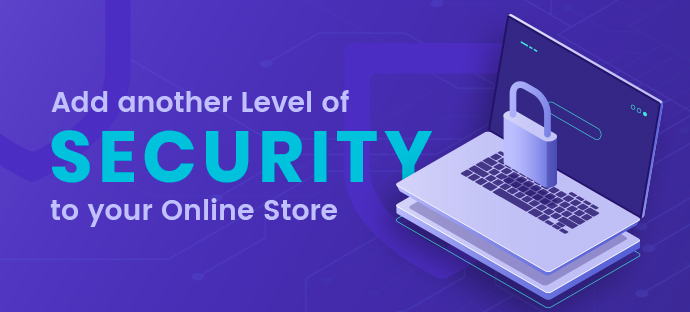Reports indicate that one in every five small online retailers fall victim to credit card fraud every year, of which 60% being forced to shut down within 6 months.
The market of e-commerce business has seen tremendous growth over the past few years, and the momentum seems to keep going upwards in the coming years as well.
E-commerce has been widely accepted as a convenient alternative to the traditional way of shopping, because of which online transactions have become the most preferred mode of payment, even in our day to day lives.
With the nonstop growth in the e-commerce industry, it has become one of the most lucrative targets for cybercriminals. The digital retail industry has witnessed a fair number of security breaches.
These security breaches could be accidental, intentional, or just a silly human error. However, the majority of these breaches happen via phishing, credit card fraud, data errors or unprotected online services.
One of the greatest causes of this e-commerce security risk for online retailers is the poor security management.
Also read: Why International players are safer than Indian eCommerce
Security Threats for e-Commerce websites:
- Phishing attacks – Phishing attacks generally aim at user’s confidential data like login credentials and credit card numbers. Attackers, posing as a trusted entity, try to deceive a victim into opening a phishing spam email, or a text message or an instant message to capture their private confidential information.
- Credit card fraud – Hackers may found multiple vulnerable areas in an e-commerce site that can work as their intrusion point to gain payment and user information. A malware can be implemented in/on such areas through which hackers will be able to extract the credit card information of the buyer. This data then can be used to commit fraudulent e-commerce transactions, ATM withdrawals etc. without the knowledge of the actual holder of the card, or can be sold in the black market for the same.
How to add another level of security to your e-commerce website
Now you may be wondering that if there can be so many loopholes or intrusion points for the hackers to enter into your website to create frauds, how can you prevent yourself from it?
Well, most of the e-commerce platforms are equipped with a good amount of built-in security features but they are not enough to protect your online store. You need an additional layer of security to bolster safer payments and data security.
Let’s take a look at some of the best practices that can be implemented to prevent e-commerce fraud and to keep your online store risk-free.
- Choose a PCI compliant hosting provider
The first and foremost step to start an online store is to choose a hosting provider. You have to make sure that the hosting provider is PCI compliant which means that it must follow certain policies and procedures that guarantee a secured payment via credit/debit card.
Some of these preventive measures include anti-malware software, risk analysis, extensive monitoring and proper encryption.
- Protection against DoS/DDoS attacks
Denial of Service (DoS) or Distributed Denial of Service (DDoS) attack is a type of cyber attack wherein the attacker seeks to make some facilities or resources unavailable to the end users by temporarily/indefinitely disrupting services of the Internet user.
You need to make sure that your website has the necessary bandwidth to shield from a DoS/DDoS attack and that your hosting provider has the optimum security measures to counter such attack.
- Implementing Multi-layered Security
One of the best ways to keep your online store protected from the cybercriminals to add multiple layers of security.
You have to ensure that your hosting provider has adequate protections in place on an ready to apply level like contact forms, search tools, and login fields.
- Monitoring all transactions
You and your hosting provider must monitor every transaction for any suspicious activity.
You can set up alerts to identify potential threats like a mismatch of billing and shipping address or multiple orders by a single user using different credit/debit cards.
- Deployment of PCI scans and updates
Your hosting provider must issue frequent updates and PCI scans to identify any potential threats that may target your online store.
It must be a standard practice to issue automatic updates in order to prevent new vulnerabilities from viruses and malware.
- Using SSL certificates to secure connection
SSL certificates are the authentication that your business is trustworthy and that your website secures the data in transit during the checkout.
These certifications ensure that your company and customers are protected against any compromised financial or important information.
- Using Two Factor Authentication
Two-factor authentication (2FA) is an extra layer of security to your online store. It means that a user needs to provide his identification in 2 ways, one will the combination of username/password and other will be the code generated in real-time like a One-time password being sent to the verified phone owned by the user.
It is easy for the hackers to crack a password, but they cannot steal this code which generally remains valid only for a short duration.
- Stronger Passwords
Hackers usually run algorithms to extract customers’ passwords. These algorithms run all the possible alpha-numeric combinations to find the exact combination quickly.
Longer passwords with a minimum length of 8 characters including a special character, a capital letter, and a numeric character are more secure. You need to let your customers know that such combination of the password is for their own protection.
- CVV requirement
Card Verification Value or CVV is the three or four digit code placed on the back of a credit/debit card.
As per the explicit PCI guidelines, retailers and e-commerce stores are not allowed to store this code even though they can keep the record of customers’ names, addresses and credit card numbers for future convenience in transactions.
As many cyber-attackers just have the credit card number and not the physical card, CVV requirement prevents any kind of fraudulent transaction by cybercriminals.
- Customer Awareness
The customers must be made aware of the law and policies that guarantee data security. It is important for you to educate your clients and customer about the practices that you follow to protect their data.
Let them know how you are safeguarding their credit/debit card information and what measures they can take to keep their personal and financial information secure.
Conclusion
An e-commerce business is not just about running an online store, but also to ensure that all your customer data are maintained with the utmost safety and security.
E-commerce security is tricky but it is your responsibility to keep your website protected from being hacked to avoid sensitive customer data from being stolen and misused.
In this article, we have covered why it is important to add another level of security to your online store and how you can practice e-commerce security on your website. There are the essentials to let your customers feel safer in doing business with you.
Contact WeDigTech – Mobile App Development Company in INDIA if you are looking to develop any e-commerce solution for mobile & web platforms.












